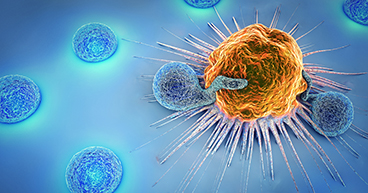
Wily cancer cells often know what works and what doesn't when it comes to thriving and surviving. While rogue cells break the rules of normal cell behavior in order to divide, grow and sometimes travel to distant organs, they also co-opt certain normal duties used by healthy cells to further their nefarious agenda. "These cell functions are good for us, but they are also good for the cancer cells," says Justin Chura, MD, Chief of Surgery & Director of Gynecologic Oncology and Robotic Surgery at our hospital in Philadelphia.
To shut down this behavior in cancer cells, doctors may use drugs called inhibitors. True to their name, inhibitors are designed to stop specific actions from occurring inside cells, in most cases by targeting certain enzymes. Tinkering with these enzymes may trigger a wide range of side effects that need to be monitored or treated—from skin rashes and gastrointestinal distress to hypertension and autoimmune diseases.
What are inhibitor drugs?
Inhibitor drugs are used to treat a variety diseases and conditions. Omeprazole (Prilosec®), for instance, is a proton pump inhibitor that blocks the enzyme that releases acid in the stomach. It is used to treat some stomach ulcers and acid-reflux disease. In recent years, new inhibitors drugs have been approved by the U.S. Food and Drug Administration to battle cancer. Checkpoint inhibitors, first approved in 2010, have shown great promise in battling certain hard-to-treat cancers, such as melanoma and lung cancer. These drugs block signaling receptors that help cancer cells hide from the immune system. Common checkpoint inhibitor drugs are pembrolizumab (Keytruda®) and nivolumab (Opdivo®).
Examples of other common inhibitor drugs that may be used to treat cancer include:
PARP inhibitors: A new treatment for ovarian cancer, these drugs are designed to stop cancer cells from repairing damage in their DNA. When the damage isn't repaired, the cells may die. Cells are constantly under assault from outside forces, such as chemicals or sunlight, which can damage their DNA. Cell division may also cause reproduction errors in DNA. Cells—whether they are normal or cancerous—can monitor damage with a protein called poly ADP-ribose polymerase (PARP) and summon genes to repair the damage. PARP inhibitors are designed to stop the repair process in cancer cells, leaving the damaged cells to die. Common PARP inhibitors used to treat ovarian cancer are olaparib (Lynparza®), which received FDA approval in December 2014, and rucaparib (Rubraca®), which was approved by the FDA in 2016.
Proteasome inhibitors: These drugs are designed to stop cancer cells from recycling old proteins into new ones, leading to a toxic overload of proteins that may kill the cell. Proteasomes are tube-like structures inside cells that break down proteins so they can be recycled. Cancer cells may rely on proteasomes more than other cells, because their runaway growth often leads to the over-production of proteins. Proteasomes inhibitors also are thought to increase levels of proteins that promote cell death, a natural process in healthy cells called apoptosis. A common proteasome inhibitor approved to treat multiple myeloma is bortezomib (Velcade®).
Angiogenesis inhibitors: These drugs may be used to stop cancer cells from developing new blood supplies. Angiogenesis is the process in which cells create new blood vessels. When tumors reach a certain size, they use proteins called growth factor receptors to tap into the body's vascular system to create a steady flow of blood that may help fuel tumor growth. Angiogenesis inhibitors seek out growth factor proteins and block them from working, cutting off the tumor's food supply. Common angiogenesis inhibitors used to treat cancer are bevacizumab (Avastin®), which may be used to treat multiple cancers, and cetuximab (Erbitux®), which may be used to treat colorectal cancer.
Tyrosine kinase inhibitors: These block signals, sent to a cell's nucleus, that may cause the cell to grow or multiply. Tyrosine kinase enzymes are often hyperactive in cancer cells and, when activated by a signaling molecule, may trigger uncontrolled growth or cell division. Tyrosine kinase inhibitors block these enzymes and may stop or slow down tumor growth. Common tyrosine kinase inhibitors used in cancer treatment are imatinib (Gleevec®), which may be used to treat leukemia, and crizotinib (Xalkori®), which may be used to treat non-small cell lung cancer.



